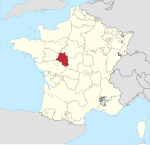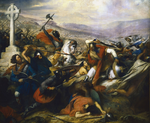2023 Tours bombing
2023 building bombings2023 in LGBT historyAlt-right terrorismAnti-LGBT and ChristianityAnti-drag sentiment ... and 10 more
Building bombings in FranceChristian terrorism in EuropeHate crimesHomophobiaLGBT in FranceMay 2023 events in FranceTransphobiaViolence against LGBT people in FranceViolence against trans menViolence against trans women
On May 23, 2023, an individual attacked the LGBT center in Tours, France, with an explosive device containing acid and aluminum. The attack resulted in no casualties as the people inside the center managed to move away from the device. An investigation for attempted murder has been opened. On June 1, 2023, the prime suspect, a 17-year-old integralist Catholic, was arrested.
Excerpt from the Wikipedia article 2023 Tours bombing (License: CC BY-SA 3.0, Authors).2023 Tours bombing
Rue des Tanneurs, Tours Vieux Tours
Geographical coordinates (GPS) Address Nearby Places Show on map
Geographical coordinates (GPS)
| Latitude | Longitude |
|---|---|
| N 47.395777777778 ° | E 0.67947222222222 ° |
Address
Rue des Tanneurs 13
37000 Tours, Vieux Tours
Centre-Val de Loire, France
Open on Google Maps











